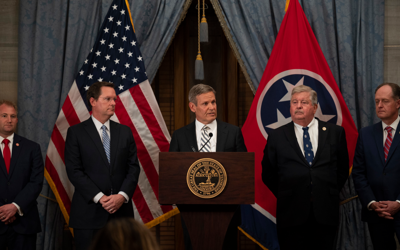
Gov. Bill Lee has signed two pieces of legislation targeting transgender people in two days, solidifying Tennessee as one of the leading states for anti-trans legislation in the country.
Lee had already signed one bill opening up public school districts to lawsuits if they allow transgender students or employees to use multi-person bathrooms or locker rooms that conform with their gender identity as opposed the gender they were assigned at birth. Another bill signed by the governor banned transgender athletes from participating in girls' sports.
But there was more to come. On Tuesday, Lee signed a bill requiring businesses and government buildings to post signs notifying the public if they allow transgender people to use multi-person bathrooms according to their gender identity. In doing so, Lee (not surprisingly) rejected the objections of groups like the ACLU, which had urged him to veto it. Tennessee — where the governor spent the entirety of the COVID-19 pandemic opposing mask mandates — is the first state to mandate such signage about which bathrooms trans people are using.
Then today, as the Associated Press reports, Lee got out his pen again to sign a bill banning doctors from providing gender-confirming hormone treatment to prepubescent minors. Tennessee is the second state to ban such treatment, following Arkansas. But while the Arkansas legislation attracted national attention, Tennessee's has flown mostly under the radar outside the state.
LGBTQ advocacy groups described Lee's signature as a discriminatory signal rather than a piece of policy meant to address a real problem.
"Governor Lee signed the discriminatory SB126," reads a tweet from the Tennessee Equality Project. "It's not a ban on gender-affirming care for trans youth who have entered puberty. It bans that health care before puberty, which health care providers are not doing. The point of it was a slap in the face and [possible] future restrictions. We don't normally put health care protocols into the code. But this bill says that the state doesn't trust trans youth, their parents, and their physicians."





